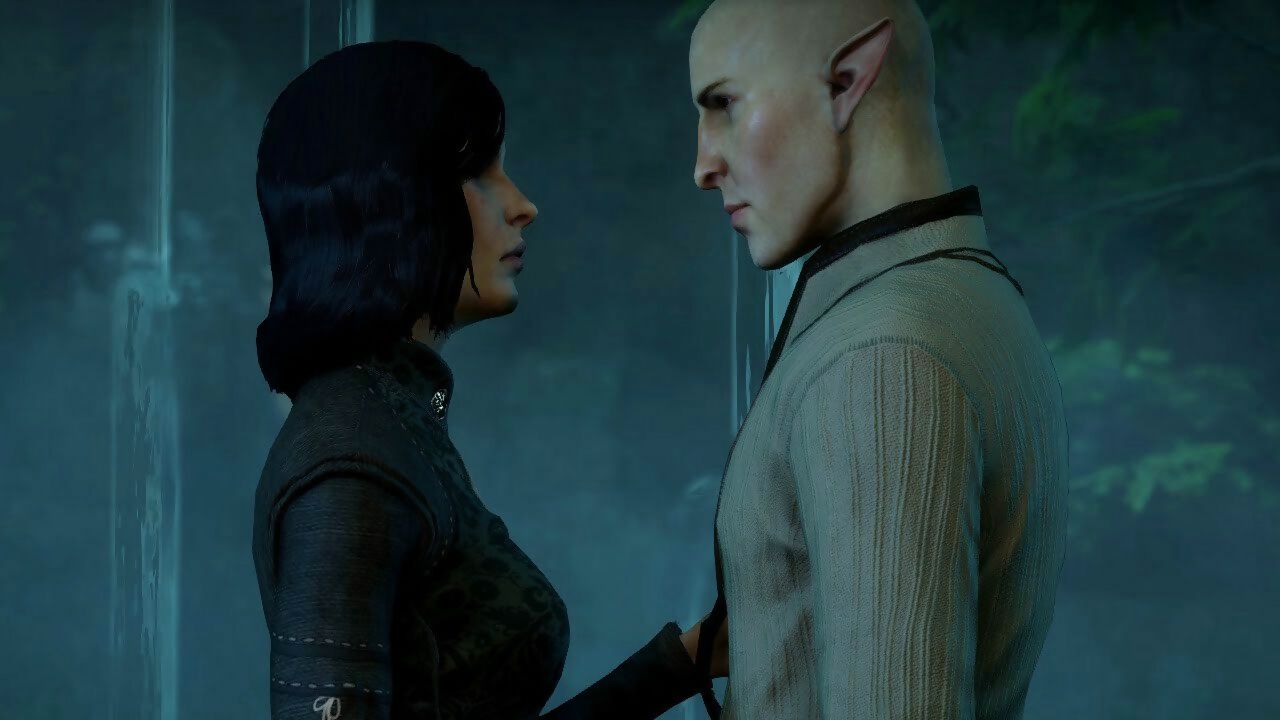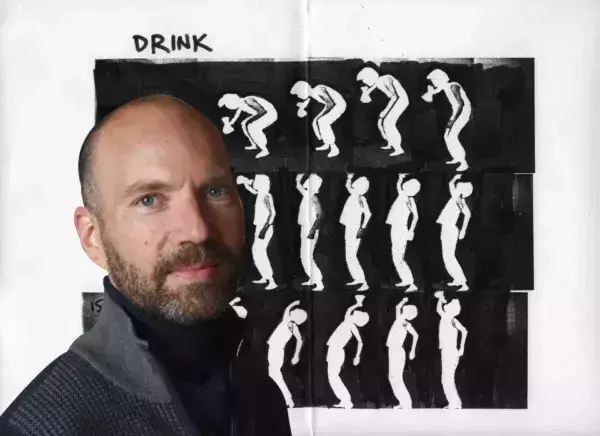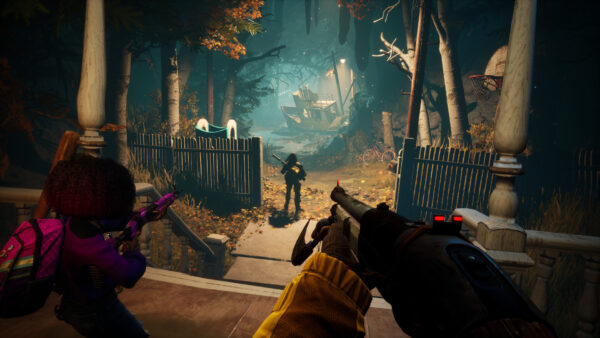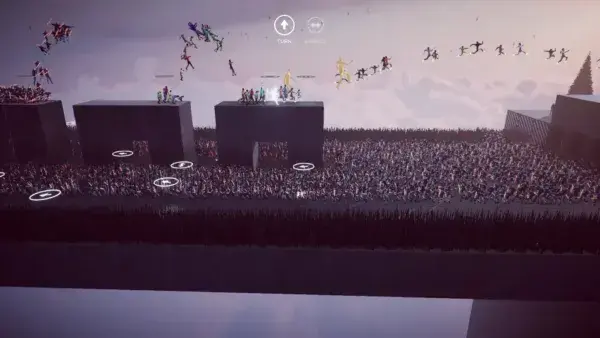
Although it would be a stretch to call it romantic, Donkey Kong was one of the earliest games to tell a visual story, with its cutscenes between levels establishing the relationship between the protagonist, Jumpman (who would later become Mario), and his love interest, Pauline.
While it was Donkey Kong’s addictive proto-platformer gameplay that would hook players across the globe, the inclusion of a romantic subplot, however rudimentary, would add an extra dimension to all of the running and jumping, providing players with a context for their actions and raising the stakes for success and failure alike.
The ‘damsel in distress’ archetype was thus born in games. It would form the template for early romantic storylines, typically consisting of a muscle-bound hero venturing across an inexplicably long journey through thug-infested streets to rescue their beloved from the endgame boss – all in the name of true love. (Why these characters never hopped in a cab and simply went straight for Mr Big however, we could never quite tell.) Beating down endless goons in 1984’s Kung-Fu Master, 1987’s Double Dragon, 1988’s Vigilante, and 1989’s Final Fight was satisfying enough, but sprinkling in a romantic subplot to save each protagonist’s girlfriend added an enticing dimension to the power fantasy.
It would take decades for romantic plots within games to escape their one-dimensional early years; maturing beyond an excuse for a character to beat people up. Eventually, romance in the medium evolved with titles such as The Sims, and the later games in the Persona series, while even GTA: San Andreas divorced romantic plots from their connection with violence. Relationships in video games would reach new heights in 2009 with Dragon Age: Origins, a dark fantasy role-playing game that along with 2007’s Mass Effect is considered to be a watershed moment for romantic plots in games.

Kung-Fu Master was one of many 1980s games that used ‘save the girlfriend’ as the motivation for punching strangers in the face.
Dragon Age: Origins and its sequels would build on the work of previous BioWare titles, including Star Wars: Knights of the Old Republic, to craft romance narratives that felt compellingly real. For David Gaider, lead writer on those games, creating non-player characters that felt three-dimensional was crucial: “I think the most important thing that you need,” he tells us, “is the sense that the character you’re romancing has a life and existence of their own, that they aren’t just puppets for whatever you want. I’ve seen games like that: you hit the ‘romance button’ and they will do whatever you want, and they exist for you regardless of your actions. I think that makes them a lot less compelling. I think the idea that this character might not decide to romance you if you do or say the wrong things, that they have their own agenda, is powerful.”
Gaider gives an example from Dragon Age: Origins as an early example of romanceable characters whose aspirations run far deeper than being the player’s love interest. “Take Morrigan, for example,” he says. “She may be romancing you, but she has her own thing going on. The fact that you are romancing her does not overtake that.” It’s a sentiment that, over a decade later, seems simple, but it’s hard to underestimate the significant impact this approach had. With the release of Origins, romanceable characters had evolved from unthinking trinkets to be awarded to the player for their victory, to becoming fully realised characters with motivations that often ran counter to the player’s own.
Forging a new path
For further proof of Dragon Age: Origins’ impact on romantic storytelling in the medium, consider the developers it has influenced since. Developer Kan Gao, of Freebird Games, is the creator of the acclaimed To The Moon series of games, which explores romantic relationships in a poignant and achingly human way. When it comes to using games to explore romance, Gao is clear where his influences stemmed from: “It would be Dragon Age: Origin,” he smiles. “Whilst it isn’t a romance game, the relationships certainly had a very real pull to them. I loved those camp scenes where after a long, hard day of battle, being in a relaxed environment with your companions made you want to seek out a connection with the characters, especially when they were presented in such a real way.”

Before the voice actors arrived, the writers on Star Wars: Knights of the Old Republic wrote some flirty dialogue… until they heard it read out and realised it was too much.
Gao would know a thing or two about creating characters and relationships that feel real. With 2011’s To The Moon, a staunchly indie title, he weaves a beautifully depicted tale of love and loss. “I think authentic romance is one that makes the player feel a sense of longing, in one sense or another, within the game world,” says Gao. “To do that, it has to feel relatable and authentic in some way to the player. For romance in any authored experience, it should certainly be more dramatic than most real-life experiences, but it comes from a vector from which most people can relate; it just extends that vector.”
To The Moon takes depictions of romance in a different direction from Dragon Age: Origins, as well as the games that have followed in its footsteps, with varying degrees of success, such as The Witcher 3: Wild Hunt, Cyberpunk 2077, the later Assassin’s Creed titles, and the Fallout games. Instead of offering choices that must be successfully navigated to achieve romantic fulfilment, the player’s instead a memory-hopping observer, watching the various stages of a relationship unfold throughout time.
“You can interact with the world, but not so much with what happens in the world,” explains Gao. “There’s certainly a wonderful type of experience from the multiple-choice style of games. Some would argue that’s what games are all about: the choices. Dragon Age: Origins is one of my favourite games; I love what they did with it. At the same time, there’s also value in the type of [romantic] experience that’s more directed – there’s a dichotomy there; you can’t give players a fully directed experience while giving players branching options. As the director, you sometimes feel ‘this is the one way we want this to go to give players a particular feeling at the ending’, and that’s the choice that I made, because all of To The Moon is really building to that last moment, what the player feels right before the credits roll. Everything else is wrapped around players feeling that moment in the way it was supposed to be felt.”

The anime style of Doki Doki Literature Club! hides a much darker game beneath its colourful veneer.
The odd couple
The conflict between player agency and developer authorship is a struggle that sits at the heart of many games, but is especially essential to romantic plots, where the player’s character is involved within a romance rather than simply observing one unfold, such as in To The Moon. In that scenario, argues Gaider, choice is essential: “Agency, in my mind, doesn’t require that the game bend to whatever your character’s romantic desires may be,” he explains. “I think it just requires that the game allows you to make a choice then, in turn, reacts to that choice. You certainly wouldn’t want a romance to proceed without input from the player either because that’s then loss of agency, too. It has to be a two-way street: when you make choices, the characters react, and when the characters make choices, you need the ability to react too, and that’s what creates the illusion of a real relationship, I think.”
While authored portrayals of romantic subplots – such as Campo Santo’s Firewatch – can still be powerful, reflecting on such an experience afterwards may seem hollow when the façade of agency is shorn away and you realise that your character’s romantic experience was largely identical to every other player’s. “That’s interesting in Firewatch,” notes Gaider, “but you don’t get to make any choices. In terms of optional romances in the BioWare style, not many games do anything that’s similar. There’s the Fallout games, 3 and 4, but they [romances] always feel like they’re a bit obligatory. Assassin’s Creed: Odyssey pleasantly surprised me with romances. It was sort of a ‘Romance 101’, but it’s great that they’re doing that.”

Romantic imagery is a key part of establishing the central relationship at the heart of To The Moon.
The notion of romances in games being nothing more than a series of correct answers or tasks that need to be completed is one that Gaider summarises as “that model of ‘romance, romance, romance, reward… and the reward is sex.’” It’s a well-worn trope in romantic scenarios in games, the illusion of ‘choice’ suggesting that players are free to pursue a romance in a number of ways, with the truth being something far more mundane, often revolving around picking correct dialogue responses or completing fetch quests.
Doki Doki Literature Club!, meanwhile, uses the player’s experience of romance in games to delightfully subversive effect. Ostensibly a dating sim, the game leads the player into a mind-bending journey that simply has to be experienced to be believed. According to the game’s creator, Dan Salvato, upending “the trope where a few simple choices can lead to the perfect outcome” was straightforward, given how entrenched within games (especially the dating sim genre), the mechanic has become.
“I didn’t need to try very hard to make the player expect a certain level of agency, because players already know how dating sims are supposed to work,” he says. “Those ‘rules’, and various other unspoken rules, are the basis of DDLC! being a disturbing experience. Once the rules are broken, you don’t even know what the game is anymore. It’s not a ‘dating sim’ – it becomes a weird, uncategorised experience that can do anything at any time, and that’s scary.”

Dragon Age: Origins’ Morrigan had an agenda beyond acting as a simple love interest to the player’s character.
Salvato is insistent that to truly develop, romance mechanics and narratives within games must continue to evolve: “Players are looking to connect with characters who have relatable human qualities, rather than characters who can live happily ever after simply because the protagonist said or did a few specific things. That’s the trope I cared the most about truly challenging – the one where all it takes is a magical combination of simple decisions for you to turn someone’s life around.”
Gaider, for his part, is unsurprised that outside of the indie sphere, mainstream titles aren’t pushing romance elements in bolder directions. “Am I surprised that other companies don’t really do romances? No. A lot of players who play through the BioWare romances are surprised to hear that only a minority of players actually even complete them. The majority of players go through the games without initiating them, for both the Mass Effect and Dragon Age games.”
Free love?
A wider issue needs to be considered here, too. An increasingly diverse player base naturally wants to see themselves, and their experiences of romance, represented on the screen. With player communities more vocal than ever before, Gaider wonders if identity politics debates make the prospect of tackling romance narratives less attractive: “In the later [BioWare] games, the fact that we had romances played into a larger conversation about sexuality and representation. It was no longer just about game content. There were players who talked about ‘their right’ to have this content provided for them, about the morality of not being provided this content. That kind of conversation ends up dominating the talk about your games, and I can totally see why some, or even a lot of developers, will think, ‘We don’t want any part of this; we just want to make an exciting combat game’.”

Donkey Kong was partly inspired by King Kong, which also used the ‘damsel in distress’ trope to iconic effect.
This is perhaps the reason, then, that we will continue to see the indie sector pushing innovation in the romance genre, where creators can continue to weave romantic stories that are personal to them, free from the intrusions of PR, marketing, algorithms, or the need to forsake depth for diversity. It’s certainly a sentiment echoed by Salvato. “I want to write characters with qualities that are personally meaningful to me,” he explains. “Maybe it can help [players] feel less alone. While I can’t definitively conclude whether shallow character representations have an observable negative impact on society, I do feel confident – based on all the incredible stories people have shared with me about Doki Doki Literature Club! – that deep and realistic character representations are magical, and they can make an enormous positive difference. I really want to be a part of that difference.”
“It feels like at this point, if you’re going to do romance content, you should take efforts to be responsible,” adds Gaider. “I think a lot of the problems that exist are generally committed by people who haven’t taken the time to think through the ramifications of what they’re making, what it’s saying.”

When Doki Doki Literature Club! reveals its true nature, the game turns conventional romance narratives on its head.
Despite romantic plots remaining fairly stagnant in triple-A titles, since the progress of the Dragon Age series, Gao believes that any games aiming to capture the essence of a meaningful relationship between two human beings should lean into the unique narrative opportunities the medium offers. “It gives us a unique lens to look at romance and relationships in a simpler way compared to real life, and there’s value and attraction in that,” he reasons. “You might say that in real life, relationships can sometimes get too complicated, whereas in video games you can pinpoint the area you want to focus on and you can get just complicated enough, so something can be learned. In many ways, the limitations [offered by video game relationships] are valuable, and in the foreseeable future, that’s the way things will stay.”





